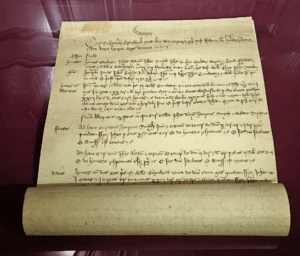Manorial roll facts for kids
A manorial roll or court roll was a special record kept by the lord of a manor in olden times. Think of a manor as a large estate with a village and farms, all managed by a lord. These rolls were like official notebooks, usually kept on long scrolls, that recorded everything important that happened at the manor's court meetings. Later, they became books.
These records were super important for tracking who lived on the land, how much rent they paid, and what rules everyone had to follow. They also noted when people died, when land was passed down to family members, or when it was sold to someone new.
Contents
What Were Manorial Rolls?
Manorial rolls were the official records of meetings held on a manor. These meetings were called manorial courts. They were a bit like local government meetings today, but for a specific estate. The court would deal with many things, from small arguments to big decisions about land.
Keeping Records in Olden Times
In the Middle Ages, these records were usually written on long pieces of parchment or paper that were rolled up, just like a scroll. This is why they were called "rolls." Later, after the Middle Ages, people started writing them in bound books, but they often still used the old name, "court rolls." Sometimes, they were also called "court books."
What Information Did They Hold?
Each entry in a manorial roll started with the date of the court meeting. Then, it listed the people chosen to be on the "jury" for that meeting. These jurors were usually important tenants from the manor. The rolls also noted if anyone who was supposed to attend couldn't make it, and if they had to pay a small fine for being absent.
The records covered all sorts of things:
- General rules, like making sure roads or gates were kept in good condition.
- Specific events, such as when a tenant had died since the last meeting.
- Who would inherit their land.
- Any land that was given up or transferred to someone else.
- Permissions given to rent out land.
How Land Was Held: Copyhold
One of the most important things recorded in the court rolls was how land changed hands between tenants. If you wanted to prove you owned or had the right to use a piece of land on the manor, you would get a "copy" of the entry from the court roll. This copy was your proof, like a modern-day deed. Because people held their land with a "copy" of the court's record, this way of holding land became known as copyhold.
See also
- Urbarium
- Land terrier
 | Delilah Pierce |
 | Gordon Parks |
 | Augusta Savage |
 | Charles Ethan Porter |


